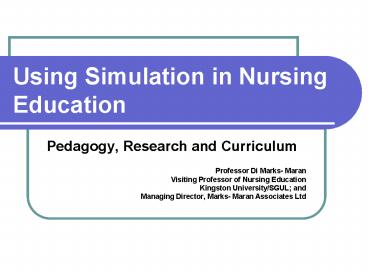Using Simulation in Nursing Education - PowerPoint PPT Presentation
1 / 21
Title:
Using Simulation in Nursing Education
Description:
Evaluative research into the use of simulation is not a medical endeavour; It is an educational endeavour! Requires educational evaluation research design ... – PowerPoint PPT presentation
Number of Views:3780
Avg rating:3.0/5.0
Title: Using Simulation in Nursing Education
1
Using Simulation in Nursing Education
- Pedagogy, Research and Curriculum
- Professor Di Marks- Maran
- Visiting Professor of Nursing Education
- Kingston University/SGUL and
- Managing Director, Marks- Maran Associates Ltd
2
Focus for this presentation
- The pedagogy of simulation
- Researching simulation
- Simulation-based curriculum
3
Simulation in healthcare education
- Critical care/high dependency (Eaves Flagg
2001 Morton 1997 Rauen 2001 Weis
Guytin-Simmons 1998 Vandry Whitman 2001) - Clinical judgement skills (Rhodes Curran 2005)
- Health assessment skills (Wilson et al 2005)
- Neonatal nursing skills (Mello 2004)
- Peri-operative care (Grailing Rusynko 2004)
- Medical education (Gaba De Anda 1988 Good et
al 1992 Gordon 2000)
4
Types of simulation
- High Fidelity simulation
- Low fidelity simulation
5
The Pedagogy of Simulation - 1
- Kerka (1997) meta-analysis of learning in
students on vocational/ professional
(role-related) education and training courses - Studies included in this meta-analysis
- Billett (1996)
- Schumann (1996)
- Lave (1996) and Lave Wenger (1991)
- Farmer, Buckmaster LeGrand (1992)
- Hart-Landsberg, Brauger Reder (1992)
6
The Pedagogy of Simulation - 2
- Tenets associates with situated learning
- Learning is grounded in the actions of everyday
situations - Knowledge is acquired situationally and
transferred to similar situations - Learning is a result of social processes
- Learning is situated in action
7
The Pedagogy of Simulation - 3
- Knowledge is created and made meaningful
- by the context in which it is acquired.
- (Farmer, Buckmaster LeGrand 1992, p. 46)
8
The Pedagogy of Simulation - 5
- Students on role-related (professional/
vocational) courses require a pedagogy that - Enables the transfer of learning from classroom
to the work setting - Provides opportunities for students to learn
actively by doing - Provides immediate feedback on learning
- Provides authentic activities guided by experts
- Is situated in a culture of practice
- Is embedded in the social context where new
knowledge will be used - Involves learning interactively with others
9
The Pedagogy of Simulation - 6
- It is not the simulation that makes the
- learning it is the pedagogy of
- simulation that makes the learning
- The pedagogy of situated learning is the
pedagogy of simulation
10
Evaluating simulation
- There is a difference between
- Evaluation
- and
- Evaluative Research
11
Evaluative research - 1
- Six evaluative research fields (Scriven 1999)
- Programme/partial programme evaluation
- Personnel evaluation
- Performance evaluation
- Policy evaluation
- Proposal evaluation
- Product evaluation
12
Evaluative research - 2
- Aspects of programme/partial programme
evaluative research - Use
- Usability
- Impact
- Sustainability
- Quality (merit)
13
Research into simulation - 1
- Systematic review of the use of simulation in
medical education (Issenberg et al 2004)
14
Research into simulation - 2
- Heterogeneity of research designmake a
quantitative synthesis of the research evidence
impossible. - (Issenberg et al 2004)
15
Research into simulation - 3
- fail to report means, standard deviations
and reliability coefficients making a
quantitative synthesis of the research evidence
impossible. - (Issenberg et al 2004)
16
Evaluative research into simulation
- Evaluative research into the use of simulation
is not a medical endeavour - It is an educational endeavour!
- Requires educational evaluation research
design
17
Findings from Issenberg et al (2004)
- High fidelity simulation facilitates learning
when used in the right conditions - Simulation complements but does not duplicate
learning on real patients in the real work
setting - The majority of evaluations carried out to date
are impact evaluations - Simulation is best used to prepare students for
real patient contact - Simulation provides a safe and forgiving learning
environment
18
Simulation in nursing education
- Radhakrishnan et al (2007)
- Seven areas of nursing practice
- Basic assessment skills (e.g. vital signs)
- Safety (including patient identification)
- Prioritisation skills
- Problem-focussed assessment of need
- Ensuing interventions after assessment
- Delegation
- Communication
19
Findings - Radhakrishnan et al (2007)-
- Experimental group scored significantly higher
for assessing vital signs and for patient
identification - All other categories, no difference from control
group
20
Evaluative Research Design
- Case study evaluation (Tellis 1997 Yin 1994)
- Realistic evaluation (Pawson Tilley 1997)
- Constructivist/Fourth Generation Evaluation
(Lincoln Guba 1989) - Action research evaluation (Wadsworth 1998)
- Utilisation-focussed evaluation (Ngambi Brown
2004) - Context-process-Product evaluation (CIPP)
Stufflebeam 2000)
21
The place of simulation in the curriculum
- Currently simulation is an add-on to existing
curricula - Programme for Nursing Curriculum Integration
(PNCI) - A vision for a future curriculum with simulation
as the starting point































